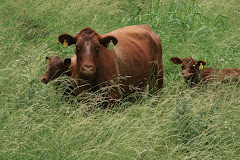
Agforce Vice President Ian Burnett (centre above), and Senior Policy Advisor Drew Wagner (2nd right) visited Felton on Wednesday to meet with Friends of Felton, and listen to the community's concerns about proposed coal mining developments - in particular Ambre Energy's so-called Felton 'Clean Coal' Project which is the subject of a mining lease application. Ambre Energy is currently preparing an EIS for this project. Attention also focussed on the neighbouring MDL 304, covering some 13,000ha, granted to Newmont Pacific Energy, which includes a large area of prime cropping land.
The point was made that Felton is a test case, being the furthest advanced project to threaten prime agricultural land. Friends of Felton also stressed the inevitable environmental impacts resulting from open-cut mining next to Hodgson Creek, a major tributary of the Condamine River, and in natural recharge areas for underground aquifers. Members of the community highlighted the social consequences of mining in such a closely settled area, and referred to the experience of the Acland community north of Oakey.
Drew Wagner, explained that Agforce has been working hard behind the scenes with the Qld Government on the issue of protecting farmland, and he hoped to see results from that process before too long. FOF members stressed the urgency of the Felton issue, given that Ambre say their EIS will be completed early next year.
A meeting of Agforce Pittsworth Branch was held in the afternoon. The following resolutions were passed unanimously -
1. 'That Agforce acknowledges the devastating effect coal mining development would have on the food production capacity, the natural environment, the watercourses and underground aquifers, and the community of Felton, and does everything in its power to ensure such development does not proceed.'
2. 'That Agforce demands the Queensland Government introduce a moratorium on new mining and gas operations on land suitable for cropping, on land closely associated with rivers and groundwater aquifers, and in closely settled rural areas, until comprehensive land use planning has been undertaken which considers the impact of such operations on agriculture, the natural environment and local communities.'
3. 'That Agforce involve representatives of communities affected by mining in developing a definition of agricultural land worthy of protection from mining development.'
Report below from The Brisbane Times -
Agforce beefs up farmers' fight against coal mines
July 23, 2009
Peak agricultural lobby group Agforce has backed Queensland farmers who are battling coal miners planning to dig up their prime agricultural farmland.
Two mining companies are preparing to mine coal worth billions of dollars which lies just under the surface of the fertile Felton Valley, 40 km south of Toowoomba on the Darling Downs and at the headwaters of the Murray-Darling Basin.
Agforce vice-president Ian Burnett toured the site on Wednesday where a hill will be removed to make way for an open-cut coal mine, which will extract 900 million tons of coal to supply an on-site petro-chemical plant.
Agforce's backing is significant because the broadacre farming group is defending smaller horticultural farmers against large mining interests.
Mr Burnett said mining would risk destroying the underground water aquifers, the closely-settled farming community and the food production of the valley.
"It's certainly good quality prime agricultural land," Mr Burnett told AAP.
"Closely-settled areas haven't been mined before.
"We will try to stop mining here. I believe it could be the opportunity to set a precedent and say 'no' to coal mining," he said.
Mining exploration permits now cover 80 per cent of the state following a 45 per cent increase in mining exploration permits.
Felton Valley spokesman Rob McCreath said Felton was a test case which would determine whether the Queensland Government could find a balance between farming and mining.
"Knowing the Queensland Government has never prevented a mine in order to protect farmland makes us more determined to win this fight," he said.
"The Premier herself has said there has got to be a balance between mining and agriculture.
"How can there be a balance if no mine has ever been stopped?"
Mr McReath said approval for the mine would set a precedent that mining will be allowed anywhere.
He said Australia had little fertile farming land and it was now urgent that it be protected for food production.
Premier Anna Bligh has been invited to tour the district but has not taken up the invitation yet.
"There's an open invitation. I really hope she comes. We'd love to show her around," Mr McCreath said.
AAP





